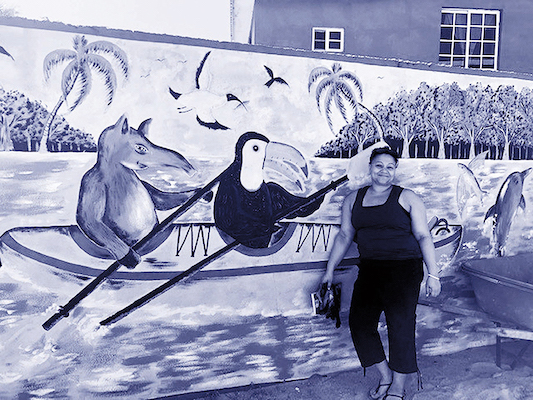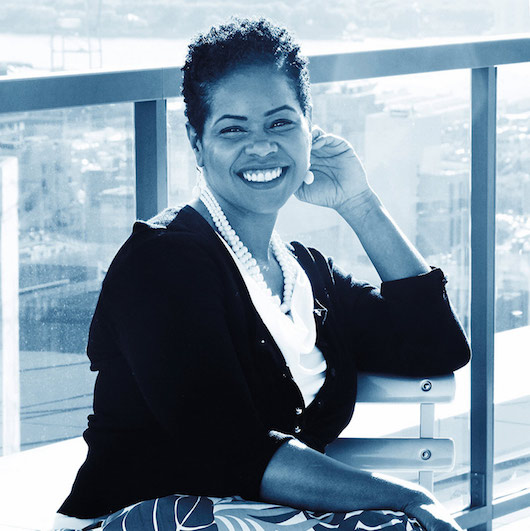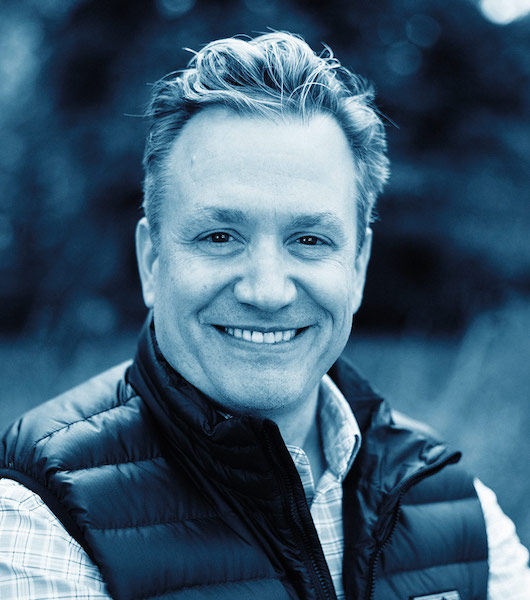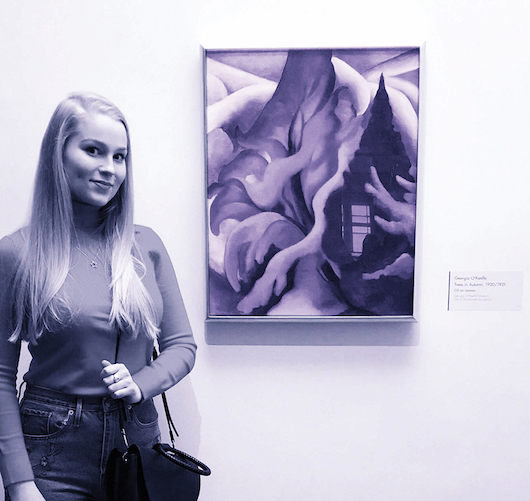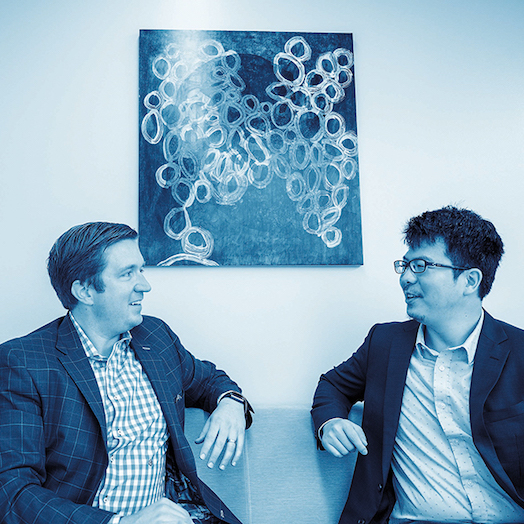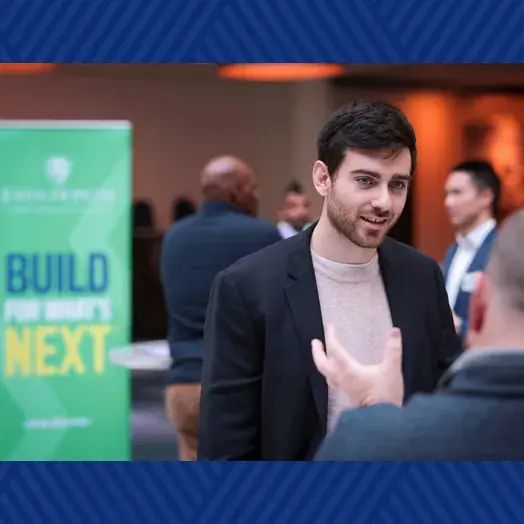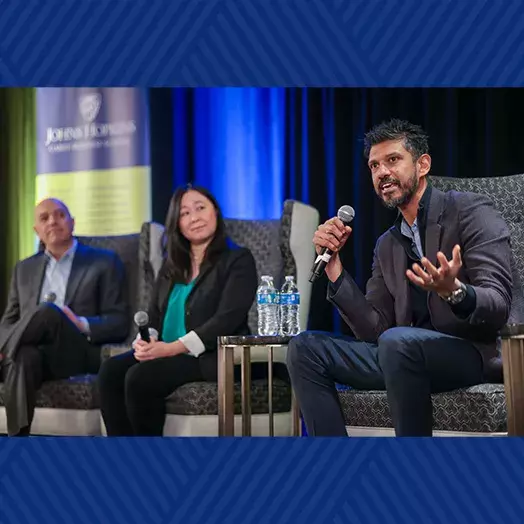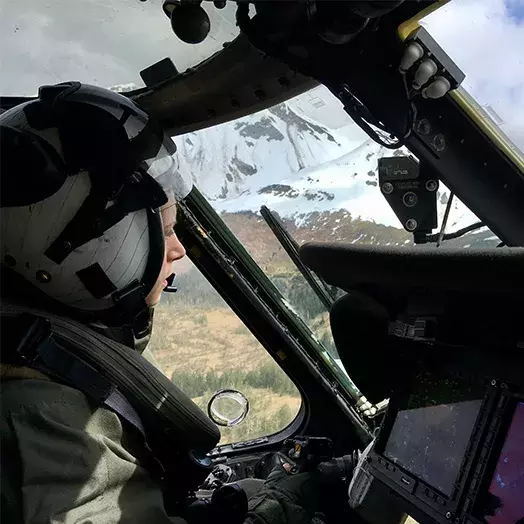Carey alums embrace the increasing opportunities to provide career advice – and friendly support – to students at the business school.
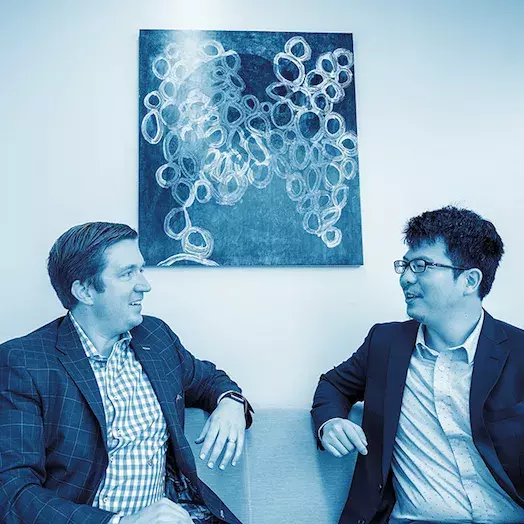
The art of mentoring
By Joan Katherine Kramer
Carey alumnus John Meduri lives in Arizona but travels the world as head of business development, global marketing and strategy, for Accelerate Diagnostics, which makes diagnostic products for hospitals and other health care institutions.
Amanda Hayes
He believes so strongly in the value of mentoring that he has extended what amounts to an open invitation to Carey MBA students looking for wisdom regarding their prospective careers: “I just tell them to text me anytime. If I’m not in the air or in a meeting, I’ll text them right back and we’ll make an appointment to talk.”
Meduri leads the Dean’s Alumni Advisory Board (DAAB) Mentoring Program for full-time MBA students. He is just one of many Carey alumni invested in mentoring today’s Carey students through formal programs like the DAAB effort and the Leading a Diverse Society initiative, conceptualized and introduced in 2017 by then-Dean Bernard Ferrari and Dean’s Advisory Council member John Hunter as a way to recruit and nurture minority students.
These and other leadership development programs at Carey are growing rapidly as alumni and students recognize the value of connecting to share wisdom and advance careers.
“Something told me to apply and, honestly, it changed my life."
Amanda Hayes
“I’ve had at least a dozen mentees to date, and it’s such a joy to share my network and help them with everything from resume design and interviewing skills to how to present yourself as a brand to potential employers and other key stakeholders,” says Meduri (MS ’94 and MBA ’00). “Plus, I really enjoy the engagement with students. I learn at least as much from them as they learn from me.”
A circle of relationships
For a dozen years, Amanda Hayes has worked as a full-time legal secretary serving six attorneys at a high-powered Washington, D.C., law firm. She is a single mother raising two boys. And she is a part-time Flexible MBA student at Carey slated to graduate this spring.
It is a strenuous balancing act performed in service of a dream – to land a job in management that challenges her and provides a more secure life for her sons. And, while she has learned a lot in the classroom, she says it wasn’t until recently that she felt part of Carey, and confident that she has what it takes to realize her ambitions.
“Last year, I saw a notice about [a new] mentorship program for part-time underrepresented minority students,” says Hayes, referring to Leading a Diverse Society. “Something told me to apply, and, honestly, it changed my life.”
The idea behind the initiative was to draw on the support of alumni of the former Leadership Development Program (LDP) for minority managers, many of whom went on to pursue ambitious careers as leaders and now want to help make Carey a more welcoming place for minority students.
Christmas Hutchinson
Hayes was paired with her first choice of mentor, Christmas Hutchinson, a senior director for corporate strategy at Verizon, who earned her LDP certificate in 2010 and MBA in 2011. Hutchinson is a breast cancer survivor who has published a book about resilience. She is also an experienced coach and mentor.
“She is a go-getter,” Hayes says. “When I read her bio, I knew right away that she has so many of the skills I need.”
In both the Leading a Diverse Society and DAAB mentoring programs, the onus is on the student to initiate and maintain the relationship. Students are cautioned that the mentor’s task is to guide them, not to secure them a job. Mentors are expected to be available to talk with the students, either on the phone or in person, at least once a month, and for email or phone conversations as needed.
Hayes says that she and Hutchinson spoke every weekend for an hour or more on the phone, and that she prepared for those meetings and even asked for homework. “I would talk to her about difficult situations at school or work, and she would help me figure out what I’d learned and how I might handle things differently next time. She has become not only a friend, but an important role model.”
“She is a go-getter. When I read her bio, I knew right away that she has so many of the skills I need."
Amanda Hayes
For most of the LDP’s existence (1990 to 2013), Professor James Calvin was its heart and soul, and its alums are devoted to the principle espoused by Calvin of a supportive community where each one looks out for the other. “He helped me a lot,” Hutchinson says.
Hayes says she and her classmates in the current Flex MBA program love Calvin, too: “He is always the same – warm, encouraging, optimistic, uplifting.”
The LDP was created to help fill a need for minority managerial candidates. Most of its graduates would later earn a Carey MBA or another graduate degree and embark on impressive careers. “We had first-level managers become mid-level managers, and a significant number who have advanced into the C-suites,” says Calvin. “Some are working in the highest levels of the federal, state, and local governments, and a number have even run for and now hold elective office. So we have a wonderful pool of people out there blazing trails, and it was really an untapped resource.”
The Leading a Diverse Society initiative was designed not only to tap into that resource but also to create a circle of relationships – alumni to current students, and even to prospective students. In just two years, the number of participants in the mentorship program has doubled. It is a way to help current students plug into the alumni network, while letting prospective students know that Carey is eager to provide them life and career support beyond the classroom.
In addition, Carey launched the Summer Business Academy last July, guided by Calvin and Roger Williams, senior associate director for diversity and inclusion. That inaugural event introduced 10 of the country’s most promising minority undergraduates to the benefits of business school, and, more specifically, the benefits of attending Carey, with its emphasis on experiential learning. Last summer’s attendees were able to participate in an MBA-style case competition, designing real-life business solutions for the local nonprofit Strong City Baltimore. Williams says three of the academy participants have since applied to Carey degree programs.
Hayes and other minority students and alums were especially thrilled by the launch in October of the new Black Alumni Network, which Williams says has “created a lot of buzz. Alumni are starting to see that Carey is genuinely committed to recruiting and supporting historically underserved scholars.” (See story on page 30.)
Says Hayes: “It’s so hard to explain how much something like this means when you spend most of your time experiencing yourself as a minority, trying to fit in. It feels like safety, inclusion. I started 2019 by going on Carey’s Belize Leadership Development Expedition [a nine-day trip to that Central American nation to practice leadership skills], which was a bonding and life-changing experience like no other. Then I found a role model and counselor and friend in Christmas [Hutchinson] through the mentorship program. And now we have the Black Alumni Network. It has all made me feel as if I finally belong.”
“I appreciate the thoughtfulness that goes into the matchmaking."
Jesse Jacoby
Thoughtful matchmaking
Informal mentoring has always existed at Carey, but formal programs like the Leading a Diverse Society initiative and the DAAB mentoring program for full-time MBA students carefully pair alumni with students, and then encourage the development of the relationship by requiring regular contact for a full six months – from the spring through the summer and into the fall.
Jesse Jacoby
“I really appreciate the duration of the program,” says mentor Jesse Jacoby, a former member of the DAAB who earned his MBA at Carey in 2002 and is a business transformation expert and consultant to Fortune 500 companies. “You have enough time to go through a lot of situations with the student, so you’re able to really get to know and help them. And I also appreciate the thoughtfulness that goes into the matchmaking.”
Jacoby was paired with Hayley Dott, who is on track to graduate with an MBA this spring and who originally wanted to be
matched with a woman mentor. “I went to a girls’ school and worked at startups and small businesses that were mostly women, and I like that comfort,” she says. “But when I did a little research about Jesse and started talking to him, I realized what a perfect match it was. My concentration is in entrepreneurship, and he is an entrepreneur and definitely a big dreamer, and he’s put me in touch with a lot of other big dreamers.”
“He is an entrepreneur and definitely a big dreamer, and he's put me in touch with a lot of other big dreamers."
Hayley Dott
Hayley Dott
The pair spoke every other week on the phone and bonded immediately. “We’re both gregarious, extroverted people,” says Dott. “I can tell, even though we’ve never met in person, because we always have a million things to say. What surprised me was his candor. He is willing to share so many life lessons that have given me a lot to think about.”
Dott had been hearing a lot about a woman named Stephanie Bradshaw who has a design studio in Baltimore and is known for her work arranging parties with extraordinary theatrical effects. A musician who studied creative writing as an undergraduate at Johns Hopkins, Dott has dreamed of a career blending business and creativity. “I just happened to mention to Jesse that I was thinking about applying for an internship with Stephanie, and he said, ‘I know Stephanie Bradshaw! We went to school together.’ So he wrote to her, I got the internship, and now I’m working there part-time as an assistant project manager.”
“Not every student had the confidence to reach out to potential mentors, so it's helpful to have a problem that gives them permission to make connections."
Chris Barnhill
Alumni mentors say they derive as much satisfaction from the relationships as their mentees do. Chris Barnhill had informally mentored at least a dozen students when, as a member of the DAAB, he was asked in 2015 to help create the formal mentoring program.
Chris Barnhill (left) and Yoshiaki Kawamura (right)
“I loved the idea,” says Barnhill, a member of the charter Global MBA class of 2012. “Part of it was just wanting current students to be afforded the same opportunities I’d enjoyed. I had a handful of informal external mentors who helped me navigate the waters of both the MBA program and life as a whole, and I’ve always viewed mentorship as important for everyone. Not every student has the confidence to reach out to potential mentors, so it’s very helpful to have a formal program that gives them permission to make those connections.”
Barnhill’s current mentee, Yoshiaki Kawamura, is an MBA candidate who spent 10 years in the tech industry in Japan and came to Carey to learn about the entrepreneurial spirit and penchant for innovation he associates with the United States.
Kawamura asked to speak with Barnhill every Wednesday morning on the phone and says those conversations have helped him navigate both the business world and his new life in Baltimore.
He says, “Chris has taught me how to behave in a professional setting as a person in a managerial position in the United States, that if we do it in an appropriate manner, we can actually make a contribution by freely expressing our opinions, coming up with better solutions. I’ve also learned from him how to lead a team and make a positive impact on a global scale, and how to reach the next level of leadership in the tech industry.”
"I encourage her to value her strengths and use them to find her place in the field."
Jessica Chao
Good skills to have
Learning to be a good mentor is itself a valuable business skill, alumni mentors say. DAAB member Jessica Chao, who earned her Carey MBA in 2012 and is director of the Clinical Innovation Center at the University of California, San Francisco, says a good manager often acts as a mentor to employees.
Even being a good mentee is a learned skill, says Roxanne Zhang, a 2020 MBA candidate who was paired this year with Chao: “When you’ve been relatively successful in your life, which a lot of Carey students have, you might have difficulty asking for help or even realizing what areas you might need help in.”
But Zhang says she found it easy to connect with Chao. Born in Shanghai and raised in Australia, Zhang earned a master’s degree in pharmacology at University College London and came to Carey when she realized she was more interested in the business of bioscience than life in a laboratory. Chao was born in the U.S. but spent much of her childhood in Hong Kong before settling with her family in Seattle. “We immediately had a lot in common, not only because she is in the health sciences, but because she is also an Asian woman who immigrated at a young age to another country,” Zhang says.
“Roxanne is still trying to figure out where she fits into the health care industry, which is vast,” says Chao, “but she is very social and able to connect with and influence people in a way I cannot, and I encourage her to value her strengths and use them to find her place in the field.”
Pairing students with mentors is a labor-intensive, collaborative effort by staff in Carey’s career development and alumni offices. One thing that promises to make it easier – and expand its reach – is an online platform called PeopleGrove. Developed in San Francisco and introduced to Johns Hopkins University as part of a major new career-oriented initiative led by Farouk Dey, vice provost for integrative learning and life design, PeopleGrove aims to directly connect students to alumni who might be able to help them.
“What’s really exciting is that this is a university-wide initiative,” says Jennifer Benson, Carey’s associate director of alumni relations, who helps administer the Leading a Diverse Society mentorship program. “We’ve already launched a pilot project to test what we call ‘flash mentoring,’ in which every student at Hopkins, no matter what their degree or school, will eventually be able to access alumni mentors from all of the different schools directly. So if you’re a Carey alum, a student from the Whiting School of Engineering can contact you and ask you to review their resume or have a career conversation.
“The other piece of this is that we expect to be able to use PeopleGrove to manage and expand our formal DAAB and Leading a Diverse Society mentorship programs. It will do the matching for us and even help us track whether students are reaching out to their assigned mentors so that, if necessary, we can gently intervene.”
The art of mentoring, whether you are a mentor, a mentee, or a staff member facilitating the process, is the art of fostering meaningful connections.
“When you've been relatively successful in your life, you might have difficulty asking for help or even realizing what areas you might need help in."
Roxanne Zhang
Professor James Calvin says it may be the most important art an aspiring manager can master. “The skills our managers need will always be the same. Organizations are made up of people, and leaders need to manage relationships and make everyone feel that they belong,” Calvin says. “If anything, our interconnectedness, all of the new technologies plus the fact that your U.S. company’s headquarters may now be in Brazil, has increased the imperative. We have to learn to work together and being willing to learn from and guide one another is the key.”
This article also appeared in the Fall 2019 edition of Carey Business.
